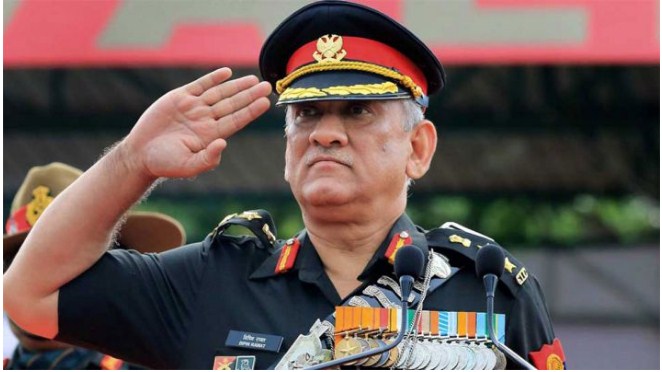India has no extraterritorial ambitions and does not want to"transplant" its ideology on others, Army Chief Gen Bipin Rawat hassaid, asserting that the country will fulfil its regional and global securityobligations as a responsible emerging power.
In an address to strategic affairs experts and defencepersonnel in Maldivian capital Male, Rawat also said instability in energy-richWest Asia has the potential to significantly increase global tensions andtrigger unrest and that the tension between the US and Iran was"worrisome".
Without naming Pakistan, the Army Chief said Indian armedforces are countering a proxy war in Jammu and Kashmir on a daily basis andthat India reserves the right to acquire military capabilities to counter anysecurity threats emanating from its neighbourhood.
The Army Chief, who is on a five-day visit to Maldives, heldextensive talks with the country's top defence brass to expand bilateralmilitary cooperation. On Wednesday, Gen Rawat called on Maldivian PresidentIbrahim Mohamed Solih. "Our strategic culture flows from two cardinals --we have no extraterritorial ambitions and no desire to transplant our ideologyon others," the Army Chief said.At the same time, he said India continuesto retain its commitment to strategic independence and autonomy in decisionmaking as well as acquiring military capabilities to counter the securitythreats and challenges emanating in its neighbourhood.
"We seek to fulfil our regional and global securityobligations, as a responsible emerging power," he said.Gen Rawatidentified "unending threat of terrorism" as the principal challengefacing the entire world while calling proliferation of weapons of massdestruction and increasing assertion of power over international norms as otherkey challenges.
"Instability in West Asia which affects energy securityof majority of the nations in the world is another major factor. It has thepotential to add significantly to global tensions and create unrest," theArmy Chief said. Gen Rawat observed that the global security environment isincreasingly becoming complex and uncertain, and that many nations areincreasingly resorting to nationalism. "I am certain that if we work withfriends, we can mitigate the hazards to regional peace," he said. "Evenin this uncertain security environment, economic interdependence, quest forcommon resources and depth of global engagements drive strategic relationships.As protectionism rises, complex global interdependencies are likely toremain," he said. Talking about challenges in the maritime domain, he saidany disruption of trade routes in the Indian Ocean Region will be a majorsecurity challenge for both India and Maldives"The Indian Ocean Region isthe lifeline to both our nations," he said.Gen Rawat said India'sstrategic vision has been in harmony with its traditional character as apeaceful and responsible nation.
"Our vision of being a sovereign, socialist, secularand democratic republic is enshrined in the preamble of our Constitution. We havealways played a constructive role in international relations. "India'snational security aim is to ensure a conducive internal and externalenvironment for unhindered economic progress and socio-political development sothat we can secure all our citizens and assume our rightful place in theemerging world order," he said. It will be Gen Rawat's first foreign visitafter taking charge as Chairman of Chiefs of Staff Committee (COSC) fromoutgoing IAF Chief Air Chief Marshal B S Dhanoa on Friday.Defence and securityties between the two countries were back on track after Solih became presidentof Maldives in November last year, after defeating Abdulla Yameen inpresidential elections.Yameen was perceived to be close to China which expandedits influence over Maldives during his presidency.The relations between Indiaand the Maldives deteriorated after Yameen imposed Emergency in the country onFebruary 5 last year.
India had criticised his decision and asked his governmentto restore the credibility of the electoral and political process by releasingpolitical prisoners. The emergency had lasted 45 daysPrime Minister NarendraModi visited the Maldives in November last year to attend Solih's swearing-inceremony. He paid a bilateral visit to Maldives in June, which was his firstforeign visit after re-election as prime minister. The visit reflected theimportance India attaches to the Maldives.
Leave a comment
Your email address will not be published. Required fields are marked *


